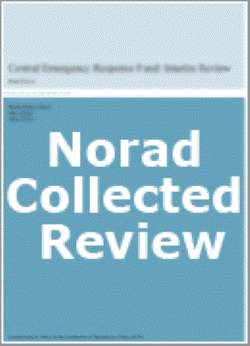Zanzibar – Public Financial Management Performance Report
About the publication
- Published: October 2010
- Series: Norad Collected Reviews
- Type: --
- Carried out by: Lead Consultant Tony Bennett and World Bank Senior Procurement Specialist Donald Mneney.
- Commissioned by: the Royal Norwegian Embassy in Dar es Salaam
- Country: Tanzania
- Theme: Governance and democracy
- Pages: 68
- Serial number: 7/2010
- ISBN: 978-82-7548-523-4
- ISSN: --

The Project
The Government of Zanzibar and donors have requested a need for common performance indicators and analyses of the public financial management (PFM) system in Zanzibar. The report provides the first comprehensive
assessment of the status of the PFM system in Zanzibar using the international recognised Public Expenditure and Financial Accountability (PEFA) Framework. This framework assesses the effectiveness and the transparency of current systems and procedures. The scores reflect the existing situation per May 2010, but the report also includes data and comparisons with progress in the previous years in some areas. The Ministry of Finance and Economic Affairs (Zanzibar) intends to use the PEFA indicators as a framework and baseline for monitoring of future PFM reforms. The Government of Zanzibar receives support to their PFM reforms from a multi donor PFM reform program for Tanzania, and in addition Norway gives project support to the Ministry of Finance to implement PFM reforms in Zanzibar.
Interesting Findings
The performance of the PFM system in Zanzibar is assessed as follows:
- There has been a major improvement the latest years in the overall credibility of the government budget of Zanzibar.
- The forecasts of domestic revenues in the budget documents have become more realistic. Also the performance of the revenue administration has improved.
- Although the aggregate fiscal discipline is fair, there are major gaps particularly with regard to public enterprises and local government authorities that are not routinely monitored on the fiscal risks they pose to the central government budget.
- The budget and the account include only part of the externally funded development expenditure, and therefore only a partial picture of resource utilization. Several donors remain unable to meet their commitments to provide forecasts and reports of disbursement in compliance with the Paris Declaration and Accra Agenda.
- There is limited transparency in the budget documentation provided to the House of Representative and in the fiscal data made available to the public. The budget process leaves insufficient time for considered legislative review and approval before the budget year starts.
- The Government has an up-to-date reporting of revenues and expenditure. However the payroll and procurement controls are weak.
- There is little data on efficiency and service delivery level. Planning for improved delivery is severely limited by unpredictability of amount and timing of resources available at delivery level.
- External audit has reduced the backlog of audits, but there are challenges in getting responses from the government to the audit remarks.
- The Government intends to use the PEFA indicators as a framework for monitoring future PFM reforms. This is also important for monitoring performance of the Norwegian project support to the Ministry of Finance in Zanzibar.
